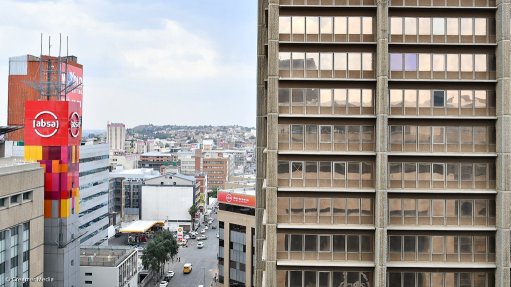Report poses serious questions about effectiveness of scrap export ban
Serious questions about the effectiveness and desirability of South Africa’s prevailing scrap export ban have been raised in a new report, which calls for its immediate lifting unless evidence can be produced showing that the ban is having the desired effect of preventing infrastructure-related theft.
Published by XA Global Trade Advisors, the report follows hot on the heels of a decision by ArcelorMittal South Africa to wind down its long-products business, partly because its integrated mills are unable to compete with those electric-arc furnaces that have secured a significant raw material advantage as a result of the trade restrictions placed on scrap.
XA Global Trade Advisors CEO Donald MacKay argues that the combination of the price preference system, scrap export duties and the prevailing export ban have distorted the domestic steel value chain and have created financial risks that could have major implications for the State-owned Industrial Development Corporation (IDC) if unwound.
The report calculates that there are yearly value transfers of R4.5-billion from metals recyclers to the scrap-based mini-mills on the three-million tons of scrap being sold yearly.
It also estimates that the IDC has built up a R14-billion exposure to scrap-metal consuming sectors, which has created an incentive to sustain these transfers to companies that have become increasingly reliant on subsidised raw materials as electricity prices rise and infrastructure fails.
“The electricity price cannot be lowered and so all the pressure is applied to the scrap recycling sector,” the report argues.
In response, the IDC told Engineering News that its exposure to steel-related companies stood at about R10-billion and was not confined to scrap-metal consuming firms.
“The rationale for the IDC support provided to mini-mills was to increase competition in the primary steel industry, improve economic inclusion, access to markets for small and medium enterprises and black industrialists, and to enhance competition in related products.
“The investment case also concerns market segmentation and the ability to comply with the market’s requirements,” the IDC stated.
It added that the mini-mills supplied a complementary range of “fit-for-purpose” commodity products which were mainly driven by competitive factors such as an ability to respond to the market in a short period of time at the right price.
“While several of the IDC’s investee companies produce the standard commodity-type bar mill range, upgrades have also taken place over the years towards higher quality products and diversification,” it added in response to questions.
The XA report also highlights a lack of data transparency since the initial ban on the export of ferrous and nonferrous scrap metal was imposed by the Department of Trade, Industry and Competition (dtic) on November 30, 2022, or following its six-month extension on July 31 this year.
MacKay says that, despite Promotion of Access to Information Act requests, no information has been released on the theft of infrastructure since the ban, with even Transnet’s cable theft data, which had been published regularly on the State-owned utility’s website, having been removed from the public domain.
Transparency, MacKay argues, is essential for assessing whether the ban’s negative economic impacts are outweighed by the benefits.
“The secrecy around scrap metal policy has created fertile ground for lobbying and corrupt decisions,” he adds.
The dtic told Engineering News it would study the report but did not want to comment so close to the closing date for comments on whether or not to extend the ban.
“All comments received by the closing date will be carefully considered by Minister Ebrahim Patel before a decision is taken.
“The Minister will consider all inputs and will carefully weigh the impact of the scrap and waste-metal ban on the steel value-chain against the substantial damage done to infrastructure and the associated disruptions to business and communities stemming from inter alia cable and railway line theft,” the dtic told Engineering News.
In a recent opinion editorial Steel and Engineering Industries Federation of Southern Africa (Seifsa) president Elias Monage reported that Seifsa had made numerous formal requests for a meeting with Patel on the scrap metal export ban and other industrial policy concerns.
“Disappointingly, the meetings have not materialised and our requests have fallen on deaf ears,” Monage wrote.
Article Enquiry
Email Article
Save Article
Feedback
To advertise email advertising@creamermedia.co.za or click here
Press Office
Announcements
What's On
Subscribe to improve your user experience...
Option 1 (equivalent of R125 a month):
Receive a weekly copy of Creamer Media's Engineering News & Mining Weekly magazine
(print copy for those in South Africa and e-magazine for those outside of South Africa)
Receive daily email newsletters
Access to full search results
Access archive of magazine back copies
Access to Projects in Progress
Access to ONE Research Report of your choice in PDF format
Option 2 (equivalent of R375 a month):
All benefits from Option 1
PLUS
Access to Creamer Media's Research Channel Africa for ALL Research Reports, in PDF format, on various industrial and mining sectors
including Electricity; Water; Energy Transition; Hydrogen; Roads, Rail and Ports; Coal; Gold; Platinum; Battery Metals; etc.
Already a subscriber?
Forgotten your password?
Receive weekly copy of Creamer Media's Engineering News & Mining Weekly magazine (print copy for those in South Africa and e-magazine for those outside of South Africa)
➕
Recieve daily email newsletters
➕
Access to full search results
➕
Access archive of magazine back copies
➕
Access to Projects in Progress
➕
Access to ONE Research Report of your choice in PDF format
RESEARCH CHANNEL AFRICA
R4500 (equivalent of R375 a month)
SUBSCRIBEAll benefits from Option 1
➕
Access to Creamer Media's Research Channel Africa for ALL Research Reports on various industrial and mining sectors, in PDF format, including on:
Electricity
➕
Water
➕
Energy Transition
➕
Hydrogen
➕
Roads, Rail and Ports
➕
Coal
➕
Gold
➕
Platinum
➕
Battery Metals
➕
etc.
Receive all benefits from Option 1 or Option 2 delivered to numerous people at your company
➕
Multiple User names and Passwords for simultaneous log-ins
➕
Intranet integration access to all in your organisation





















